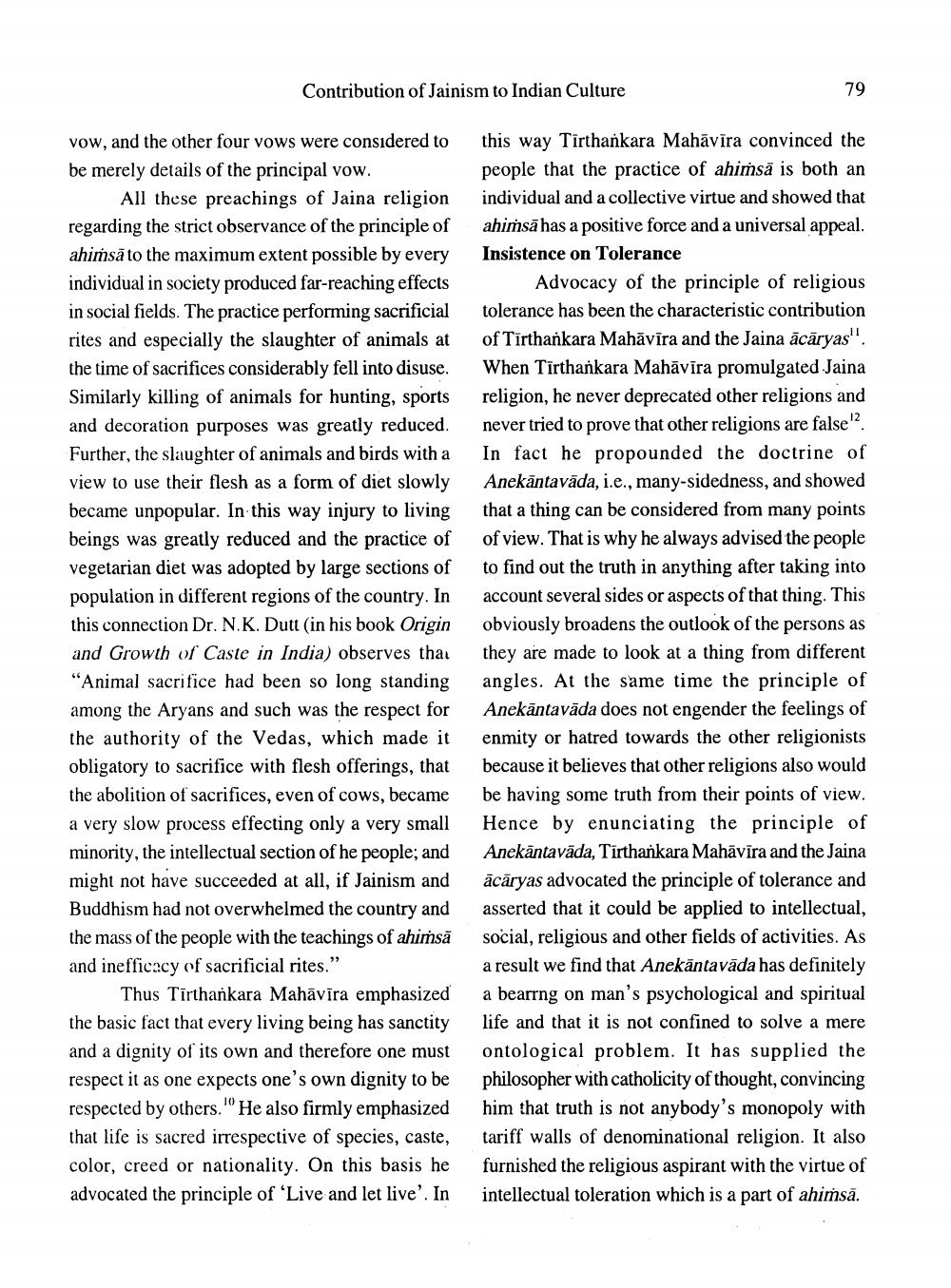________________
Contribution of Jainism to Indian Culture
79
vow, and the other four vows were considered to be merely details of the principal vow.
All these preachings of Jaina religion regarding the strict observance of the principle of ahimsā to the maximum extent possible by every individual in society produced far-reaching effects in social fields. The practice performing sacrificial rites and especially the slaughter of animals at the time of sacrifices considerably fell into disuse. Similarly killing of animals for hunting, sports and decoration purposes was greatly reduced. Further, the slaughter of animals and birds with a view to use their flesh as a form of diet slowly became unpopular. In this way injury to living beings was greatly reduced and the practice of vegetarian diet was adopted by large sections of population in different regions of the country. In this connection Dr. N.K. Dutt (in his book Origin and Growth of Caste in India) observes that "Animal sacrifice had been so long standing among the Aryans and such was the respect for the authority of the Vedas, which made it obligatory to sacrifice with flesh offerings, that the abolition of sacrifices, even of cows, became a very slow process effecting only a very small minority, the intellectual section of he people; and might not have succeeded at all, if Jainism and Buddhism had not overwhelmed the country and the mass of the people with the teachings of ahimsā and inefficacy of sacrificial rites."
Thus Tirthankara Mahāvīra emphasized the basic fact that every living being has sanctity and a dignity of its own and therefore one must respect it as one expects one's own dignity to be respected by others. He also firmly emphasized that life is sacred irrespective of species, caste, color, creed or nationality. On this basis he advocated the principle of 'Live and let live'. In
this way Tirthankara Mahävīra convinced the people that the practice of ahissä is both an individual and a collective virtue and showed that ahimsā has a positive force and a universal appeal. Insistence on Tolerance
Advocacy of the principle of religious tolerance has been the characteristic contribution of Tīrthankara Mahāvīra and the Jaina ācāryas". When Tīrthankara Mahāvīra promulgated Jaina religion, he never deprecated other religions and never tried to prove that other religions are false"? In fact he propounded the doctrine of Anekāntavāda, i.e., many-sidedness, and showed that a thing can be considered from many points of view. That is why he always advised the people to find out the truth in anything after taking into account several sides or aspects of that thing. This obviously broadens the outlook of the persons as they are made to look at a thing from different angles. At the same time the principle of Anekāntavāda does not engender the feelings of enmity or hatred towards the other religionists because it believes that other religions also would be having some truth from their points of view. Hence by enunciating the principle of Anekäntaväda, Tirthankara Mahāvīra and the Jaina ācāryas advocated the principle of tolerance and asserted that it could be applied to intellectual, social, religious and other fields of activities. As a result we find that Anekāntavāda has definitely a bearrng on man's psychological and spiritual life and that it is not confined to solve a mere ontological problem. It has supplied the philosopher with catholicity of thought, convincing him that truth is not anybody's monopoly with tariff walls of denominational religion. It also furnished the religious aspirant with the virtue of intellectual toleration which is a part of ahimsā.




